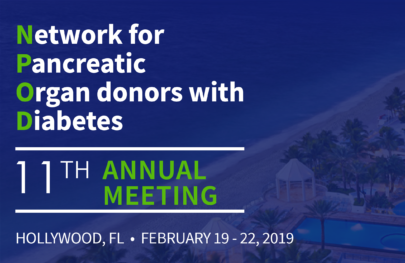
At the Network for Pancreatic Organ Donors with Diabetes (nPOD) Meeting—its 11th annual and taking place February 19-22—more than 215 people are attending, including some of the most world-renowned diabetes investigators. Many of the latest advances will be discussed—using nPOD samples—to accelerate breakthroughs to cure, prevent, and treat type 1 diabetes (T1D) and its complications.
Here is Carmella Evans-Molina, M.D., Ph.D., co-executive director of nPOD, giving a preview of the exciting themes at the meeting:
Additionally, here are some of the things that Breakthrough T1D is looking out for:
- Subgroups: This reclassification of T1D in the next few years, potentially, will help our understanding of the T1D and create therapeutic approaches that are more personalized. This will be presented by Sarah Richardson, Ph.D., from the University of Exeter, UK.
- Emerging Technologies: Technology has transformed care for T1D, and these emerging technologies will be no different. Presentations will be made by Patrick MacDonald, Ph.D., of the University of Alberta, Edmonton, Canada, Long Cai, Ph.D., of CalTech, and Nikolay Ninov, Ph.D., of the Technische Universität Dresden.
- CAR-T (Regulatory) Cell Therapy: The CAR-T cell therapy has revolutionized the treatment of blood cancers, notably leukemia and lymphoma. Some people are cured. Can CAR-T regulatory therapy be the same for an autoimmune disease like T1D? We’ll see. Presented by Jim Riley, Ph.D., of the University of Pennsylvania.
- Prevention of T1D: Proinsulin, which is then made into insulin by people without T1D, may be a marker of stress on beta cells. This will be presented by Emily Sims, M.D., of Indiana University. There is also an insulin-specific B cell immune therapy, for prevention of T1D, presented by Todd Zion, Ph.D., at Akston Biosciences Corporation.
Since it was established in 2007 with a grant from Breakthrough T1D, nPOD has collected and processed more than 50,000 tissue samples from organ donors who had or were at increased risk for T1D, and is conducting more than 250 studies to unlock the mysteries of the human pancreas. It is now the world’s largest tissue bank dedicated to the study of the human pancreas in T1D. For more information on nPOD, you can visit their website here.
You are helping us find ways prevent, treat and—one day—cure T1D. Find out more about Breakthrough T1D here.